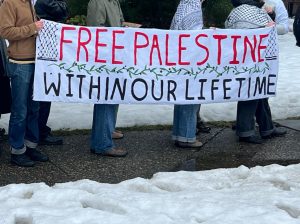Local Artists: Jon Betz
April 6, 2017
Walla Walla native Jon Betz, a documentary filmmaker specializing in environmental and humanitarian issues, returned to his hometown on March 29 for a special screening of his latest project, “SEED: The Untold Story,” at the Gesa Power House Theatre.
The film, which Betz produced and co-directed with Taggart Siegel, centers on the loss of seed diversity over the past century, the attempts by large scale agribusinesses to monopolize seeds and the independent efforts of seed keepers and seed banks around the world to preserve seed diversity. The film stresses that these efforts would be greatly beneficial in the event of a major crop blight, natural disaster or the discovery of unexpected medicinal properties.
For Betz and Siegel, an important feature of the documentary is its visual distinctness and artistry.
“We enjoy doing things that are creative and a little different in our films, something to defy the typical issue-driven documentary,” Betz said. “I think both Taggart and I are not interested in just making a purely issue-driven documentary.”
This is notably reflected by the visual style of the film that looks at the physical structure and movement of seeds in great detail, particularly in the opening.
“They’re stationary objects, we don’t think of them as moving creatures, but seeds actually move in a variety of ways,” Betz said. “In the opening sequence we try to show some of that, and we also showed seeds with extreme close-ups, so we can see some of the art and architecture.”
This opening sequence includes a number of cleverly conceived and visually engrossing imagery of sprouting seeds, bursting popcorn and close-up analyses. It also boasts of one incredible artistic endeavor courtesy of Sara Mapelli, who had worked with Betz and Siegel on their previous film, “Queen of the Sun.”
In “SEED,” Mapelli lies down in a pink dress atop bags of seeds, and, in a time-lapse sequence, plants begin to sprout all over her body.
“Her idea was so bonkers and so crazy that we thought, ‘Okay, we’ll do it,’” Betz said.
As Betz described, Mapelli soaked a dress with wet paper towels, before lining it with seeds. Betz recalled his awe at the whole process.
“Right before they sprouted, she put the dress on and she laid down on this bed, and she laid down there for 64 hours while seeds sprouted all over her body,” Betz said. “And all of the movements that she makes, those are all movements that she’s making in her sleep, I mean it’s like this insane amount of time that she spent doing it, but she loved it.”
In “Queen of the Sun,” Mapelli had performed a similarly unorthodox feat, dancing with thousands of bees lining her body.
For Betz, the appeal of such visually interesting elements goes beyond their novelty value; they link thematically with the material.
“We [the directors] wanted to give the film some of the soul and some of the life that comes with seeds,” Betz said.
For Betz, screening “SEED” in his hometown was an encouraging, uplifting experience, particularly seeing something of a debate emerge in the Q&A session.
“It was great to screen ‘SEED’ in Walla Walla because this is a farming community, conventional farming and organic farming,” Betz said. “It was awesome to come to a community like Walla Walla and see both sides of the issue portrayed in the audience, whereas some screenings are one-sided … having screenings where it’s a dialogue is something we want with the film.”
“SEED: The Untold Story” is currently available on DVD and streaming, with a national broadcast on PBS scheduled for April 17.







